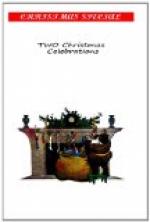became rich, did not like the match. “It
won’t do,” said he, “for a poor young
man to marry into one of our fust families; what is
the use of aristocracy if no distinction is to be
made, and our daughters are to marry Tom, Dick, and
Harry?” But Amelia took the matter sorely to
heart; she kept her love, yet fell into a consumption,
and so wasted away; or, as one of the neighbors said,
“she was executed on the scaffold of an upstart’s
vulgarity.” Nathan loved no woman in like
manner afterwards, but after her death went to India,
and remained years long. When he returned and
established his business in Boston, he looked after
her relations, who had fallen into poverty. Nay,
out of the mire of infamy he picked up what might
have been his nephews and nieces, and, by generous
breeding, wiped off from them the stain of their illicit
birth. He never spoke of poor Amelia; but he
kept a little locket in one end of his purse; none
ever saw it but his sister, who often observed him
sitting with it in his hand, hand hour by hour looking
into the fire of a winter’s night, seeming to
think of distant things. She never spoke to him
then, but left him alone with his recollections and
his dreams. Some of the neighbors said he “worshipped
it;” others called it “a talisman.”
So indeed it was, and by its enchantment he became
a young man once more, and walked through the moonlight
to meet an angel, and with her enter their kingdom
of heaven. Truly it was a talisman; yet if
you
had looked at it, you would have seen nothing in it
but a little twist of golden hairs tied together with
a blue silken thread.
Aunt Kindly had never been married; yet once in her
life, also, the right man seemed to offer, and the
blossom of love opened with a dear prophetic fragrance
in her heart. But as her father was soon after
struck with palsy, she told her lover they must wait
a little while, for her first duty must be to the
feeble old man. But the impatient swain went
off and pinned himself to the flightiest little humming-bird
in all Soitgoes, and in a month was married, having
a long life before him for bitterness and repentance.
After the father died, Kindly remained at home; and
when Nathan returned, years after, they made one brotherly
and sisterly household out of what might else have
gladdened two connubial homes. “Not every
bud becomes a flower.”
Uncle Nathan sat there, his locket in his hand, looking
into the fire; and as the wind roared in the chimney,
and the brands crackled and snapped, he thought he
saw faces in the fire; and when the sparks rose up
in a little cloud, which the country children call
“the people coming out of the meeting-house,”
he thought he saw faces in the fire; they seemed to
take the form of the boys and girls as he had lately
seen them rushing out of the Union School-house, which
held all the children in the village; and as he recognized
one after the other, he began to wonder and conjecture
what would be the history of this or that particular




